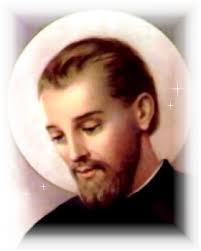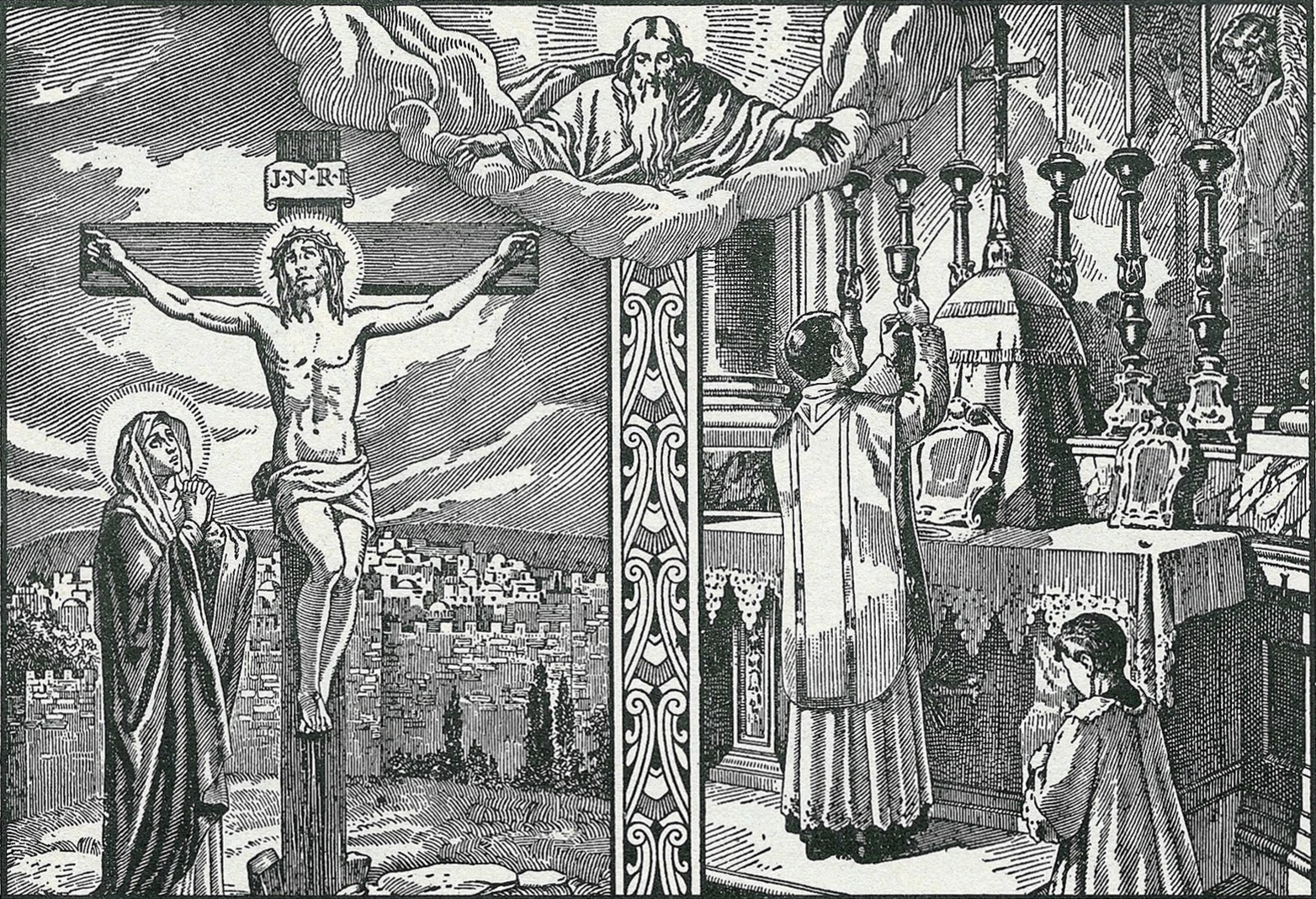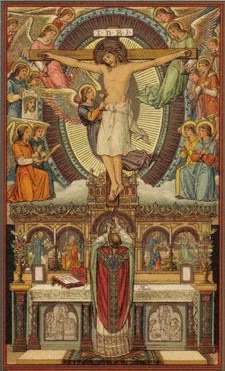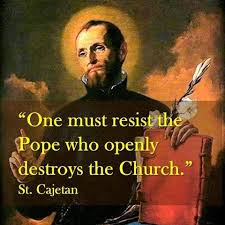August 7
Feast of Saint Cajetan – Confessor
St. Cajetan was born in 1480 in Lombardy, of pious and noble parents. From childhood he was known as a saint and in later years as “a hunter of souls.” Even before St. Ignatius he undertook to establish a body of Clerks Regular following the apostolic life. Together with Pietro Carafa, afterwards Pope Paul IV, he took the austere vow of entrusting himself entirely to Divine Providence and living solely on any alms which might be voluntarily given by the faithful. Christian Rome venerates him as one of her most distinguished citizens. He took a notable part in the reform of the Breviary under Clement VII. When celebrating Mass in St. Mary’s Major at the crib of Our Lord, he merited the grace of holding the divine Infant in his arms. Worn out with toil and sickness he went to his reward in 1547.
Saint Cajetan of Thienna, From the Liturgical Year
Cajetan appeared in all his zeal for the sanctuary at the time when the false reform was spreading rebellion throughout the world. The great cause of the danger had been the incapacity of the guardians of the holy City, or their connivance by complicity of heart or of mind with pagan doctrines and manners introduced by an ill-advised revival. Wasted by the wild boar of the forest, could the vineyard of the Lord recover the fertility of its better days? Cajetan learned from Eternal Wisdom the new method of culture required by an exhausted soil.
The urgent need of those unfortunate times was that the clergy should be raised up again by worthy life, zeal, and knowledge. For this object men were required, who being clerks themselves in the full acceptation of the word, with all the obligations it involves, should be to the members of the holy hierarchy a permanent model of its primitive perfection, a supplement to their shortcomings, and a leaven, little by little raising the whole mass. But where, save in the life of the counsels with the stability of its three vows, could be found the impulse, the power, and the permanence necessary for such an enterprise? The inexhaustible fecundity of the religious life was no more wanting in the Church in those days of decadence than in the periods of her glory. After the monks, turning to God in their solitudes and drawing down light and love upon the earth seemingly so forgotten by them; after the mendicant Orders, keeping up in the midst of the world their claustral habits of life and the austerity of the desert: the regular clerks entered upon the battle-field, whereby their position in the fight, their exterior manner of life, their very dress, they were to mingle with the ranks of the secular clergy; just as a few veterans are sent into the midst of a wavering troop, to act upon the rest by word and example and dash.
Like the initiators of the great ancient forms of religious life, Cajetan was the Patriarch of the Regular Clerks. Under this name Clement VII., by a brief dated 24th June, 1524, approved the institute he had founded that very year in concert with the Bishop of Theati, from whom the new religious were also called Theatines. Soon the Barnabites, the Society of Jesus, the Somasques of St. Jerome Emilian, the Regular Clerks Minor of St. Francis Carracciolo, the Regular Clerks ministering to the sick, the Regular Clerks of the Pious Schools, the Regular Clerks of the Mother of God, and others, hastened to follow in the track, and proved that the Church is ever beautiful, ever worthy of her Spouse; while the accusation of barrenness hurled against her by heresy, rebounded upon the thrower.
Cajetan began and carried forward his reform chiefly by means of detachment from riches, the love of which had caused many evils in the Church. The Theatines offered to the world a spectacle unknown since the days of the Apostles; pushing their zeal for renouncement so far as not to allow themselves even to beg, but to rely on the spontaneous charity of the faithful. While Luther was denying the very existence of God’s Providence, their heroic trust in It was often rewarded by prodigies.
Cajetan was born at Vicenza of the noble house of Thienna, and was at once dedicated by his mother to the Virgin Mother of God. His innocence appeared so wonderful from his very childhood that everyone called him “the “Saint.” He took the degree of Doctor in canon and civil law at Padua, and then went to Rome where Julius II. made him a Prelate. When he received the priesthood, such a fire of divine love was enkindled in his soul, that he left the court to devote himself entirely to God. He founded hospitals with his own money and himself served the sick, even those attacked with pestilential maladies. He displayed such unflagging zeal for the salvation of his neighbor that he earned the name of the “Hunter of souls.”
His great desire was to restore Ecclesiastical discipline, then much relaxed, to the form of the Apostolic life, and to this end he founded the Order of Regular Clerks. They lay aside all care of earthly things, possess no revenues, do not beg even the necessaries of life from the faithful, but live only on alms spontaneously offered. Clement VII. having approved this institution, Cajetan made his solemn vows at the High Altar of the Vatican basilica, together with John Peter Caraffa, Bishop of Chieti, who was afterwards Pope Paul IV., and two other men of distinguished piety. During the sack of Rome, he was most cruelly treated by the soldiers, to make him deliver up his money, which the hands of the poor had long ago carried into the heavenly treasures. He endured with the utmost patience stripes, torture, and imprisonment. He persevered unfalteringly in the kind of life he had embraced, relying entirely upon Divine Providence: and God never failed him, as was sometimes proved by miracle.
He was a great promoter of assiduity at the divine worship, of the beauty of the House of God, of exactness in holy ceremonies, and of the frequentation of the most Holy Eucharist. More than once he detected and foiled the wicked subterfuges of heresy. He would prolong his prayers for eight hours, without ceasing to shed tears; he was often rapt in ecstasy and was famous for the gift of prophecy. At Rome, one Christmas night, while he was praying at our Lord’s crib, the Mother of God was pleased to lay the Infant Jesus in his arms. He would spend whole nights in chastising his body with disciplines, and could never be induced to relax anything of the austerity of his life: for he would say, he wished to die in sackcloth and ashes. At length he fell into an illness caused by the intense sorrow he felt, at seeing the people offend God by a sedittion; and at Naples, after being refreshed by a heavenly vision, he passed to heaven. His body is honored with great devotion in the Church of St. Paul in that town. As many miracles worked by him both living and dead made his name illustrious, Pope Clement X. enrolled him amongst the Saints.
Who has ever obeyed so well as thou, O great Saint, that word of the Gospel: Be not solicitous therefore saying: What shall we eat? or what shall we drink? or wherewith shall we be clothed (St. Matth. vi. 31)? Thou didst understand, too, that other divine word: The workman is worthy of his meat (Ibid. x. 10. 3), and thou knewest that it applied principally to those who labor in word and doctrine (1 Tim. v. 17.). Thou didst not ignore the fact that other sowers of the word had before thee founded on that saying the right of their poverty, embraced for God’s sake, to claim at least the bread of alms. Sublime right of souls eager for opprobrium in order to follow Jesus and to satiate their love! But Wisdom, who gives to the desires of the Saints the bent suitable to their times, caused the thirst for humiliation to be overruled in thee by the ambition to exalt in thy poverty the holy Providence of God; this was needed in an age of renewed paganism, which, even before listening to heresy, seemed to have ceased to trust in God. Alas! even of those to whom the Lord had given himself for their possession in the midst of the children of Israel, it could be truly said that they sought the goods of this world like the heathen. It was thy earnest desire, O Cajetan, to justify our Heavenly Father and to prove that He is ever ready to fulfil the promise made by His adorable Son: Seek ye therefore the kingdom of God, and His justice, and all these things shall be added unto you (St. Matth. vi. 33).
Circumstances obliged thee to begin in this way the reformation of the sanctuary, whereunto thou wert resolved to devote thy life. It was necessary, first, to bring back the members of the holy militia to the spirit of the sacred formula of the ordination of clerks, when, laying aside the spirit of the world together with its livery, they say in the joy of their hearts: “The Lord is the portion of my inheritance and of my cup: it is Thou, O Lord, that wilt restore my inheritance to me (Ps. xv. 5).”
The Lord, O Cajetan, acknowledged thy zeal and blessed thine efforts. Preserve in us the fruit of thy labour. The science of sacred rites owes much to thy sons; may they prosper, in renewed fidelity to the traditions of their father. May thy patriarchal blessing ever rest upon the numerous families of Regular Clerks which walk in the footsteps of thine own. May all the ministers of holy Church experience the power thou still hast, of maintaining them in the right path of their holy state, or, if necessary, of bringing them back to it. May the example of thy sublime confidence in God, teach all Christians that they have a Father in heaven, whose Providence will never fail His children.
St Donatus – Bishop and Martyr
There is also a commemoration of St. Donatus, Bishop and Martyr who suffered martyrdom under Emperor Julian the Apostate, in 361. This Bishop of Arezzo in Tuscany was illustrious for his sanctity and for his gift of working miracles. The Church has always remembered him with the highest veneration.
MASS PROPERS
Feast of Saint Cajetan, Confessor with a Commemoration of St. Donatus, Bishop and Martyr
Friday day in the Tenth week after Pentecost
Double / White Vestments
Missa “Os justi”
INTROIT: Psalm 76: 19
The mouth of the just man shall meditate wisdom and his tongue shall speak judgment: the law of his God is in his heart.
Ps. 36: 1 – Be not emulous of evil-doers; nor envy them that work iniquity. Glory be to the Father and to the Son and to the Holy Ghost, as it was in the beginning, is now and ever shall be, world without end.
COLLECT
O God, Who didst give to Blessed Cajetan, Thy confessor, the grace to imitate the apostolic way of life, grant us by his intercession and example ever to trust in Thee and to desire only heavenly things. Through the same Lord Jesus Christ, Thy Son, Who liveth and reigneth with Thee in the unity of the Holy Ghost, God, Forever and ever.
Commemoration of St. Donatus
Let us pray. God, the glory of Thy priests, grant, we beseech Thee, that we may experience the assistance of Thy holy martyr and bishop, Donatus, whose festival we celebrate. Through our Lord Jesus Christ, Thy Son, Who liveth and reigneth with Thee in the unity of the Holy Ghost, one God
EPISTLE: Ecclus. 31: 8-11
Lesson from the Book of Wisdom. Blessed is the man that is found without blemish, and that hath not gone after gold, nor put his trust in money nor in treasures. Who is he, and we will praise him? For he hath done wonderful things in his life. Who hath been tried thereby, and made perfect, he shall have glory everlasting: he that could have transgressed, and hath not transgressed, and could do evil things,and hath not done them: therefore are his goods established in the Lord, and all the church of the saints shall declare his alms.
GRADUAL: Psalm 91: 13, 14
The just shall flourish like the palm-tree; he shall grow up like the cedar of Libanus in the house of the Lord.
To show forth Thy mercy in the morning, and Thy truth in the night.
ALLELUIA: James 1: 12
Blessed is the man that endureth temptation; for when he hath been proved, he shall receive the crown of life. Alleluia, alleluia.
GOSPEL: Matthew 6: 24-33
At that time, Jesus said to His disciples: “No man can serve two masters for he will hate the one and love the other, or he will sustain the one and despise the other. You cannot serve God and mammon. Therefore I say to you, be not solicitous for your life, what you shall eat, nor for your body, what you shall put on. Is not the life more than the meat, and the body more than the raiment? Behold the birds of the air for they neither sow nor do they reap, nor gather into barns, and your heavenly Father feedeth them. Are you not of much more value than they? And which of you, by taking thought, can add to his stature one cubit? And for raiment, why are you solicitous? Consider the lilies of the field, how they grow; they labor not, neither do they spin but I say to you, that not even Solomon in all his glory was arrayed as one of these. Now if God so clothe the grass of the field, which is today, and tomorrow is cast in the oven, how much more you, O ye of little faith! Be not solicitous therefore saying: What shall we eat, or what shall we drink, or wherewith shall we be clothed? for after all these things do the heathen seek. For your Father knoweth that you have need of all these things. Seek ye therefore first the kingdom of God, and His justice and all these things shall be added unto you.”
OFFERTORY: Psalm 88: 25
Let us pray. My truth and My mercy shall be with him: and in My name shall his horn be exalted.
SECRET
Grant, we beseech Thee, O almighty God, that our humble offerings may be both pleasing to Thee in honor of Thy saints and may cleanse us alike in body and soul. Through our Lord Jesus Christ, Thy Son, Who liveth and reigneth with Thee in the unity of the Holy Ghost, God, Forever and ever.
Commemoration Secret of St. Donatus
Let us pray. Grant, we beseech Thee, O Lord, that through the intercession of Thy holy bishop and martyr, Donatus, whom we venerate with the offerings dedicated to the praise of Thy name, the fruit of tender devotion may increase in us. Through our Lord Jesus Christ, Thy Son, Who liveth and reigneth with Thee in the unity of the Holy Ghost, one God Forever and ever.
PREFACE Common Preface
It is truly meet and just, right and for our salvation that we should at all times and in all places, give thanks unto Thee, O holy Lord, Father almighty, everlasting God: through Christ our Lord. Through Whom the Angels praise Thy Majesty, the Dominations worship it, the Powers stand in awe. The Heavens and the Heavenly hosts together with the blessed Seraphim in triumphant chorus unite to celebrate it. Together with them we entreat Thee, that Thou mayest bid our voices also to be admitted, while we say in lowly praise:
COMMUNION: Matthew 24: 46-47
Blessed is the servant, whom when the Lord shall come, He shall find watching: Amen I say to you, He shall set him over all his goods.
POSTCOMMUNION
We beseech Thee, O almighty God, that we, who have partaken of Heavenly nourishment, may, by the intercession of blessed Cajetan; Thy confessor, be fortified by it against all adverse influences Through our Lord Jesus Christ, Thy Son, Who liveth and reigneth with Thee in the unity of the Holy Ghost, God, For ever and ever.
Commemoration Postcommunion of St. Donatus
Almighty and merciful God, Who dost make us both the partakers and the ministers of Thy sacraments, grant, we beseech Thee, that, by the intercession of blessed Donatus, Thy martyr and bishop, we may profit both by our fellowship with him in faith and by our worthy service. Through our Lord Jesus Christ, Thy Son, Who liveth and reigneth with Thee in the unity of the Holy Ghost, one God








No comments:
Post a Comment